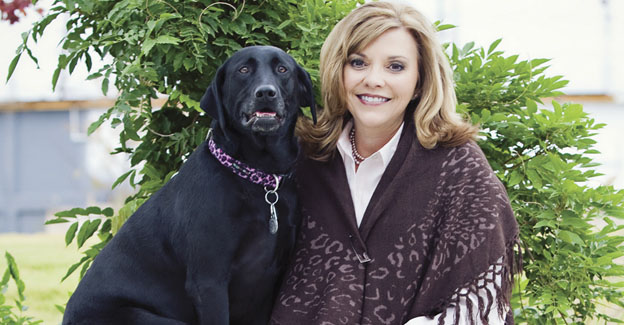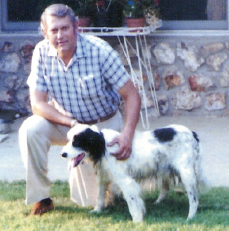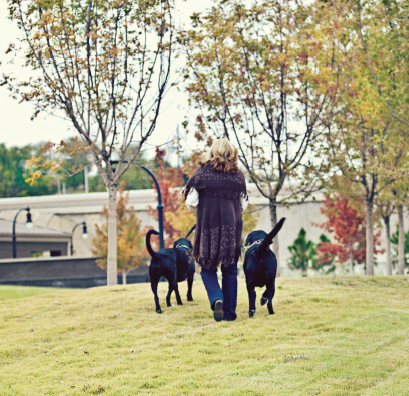Writing in Fur

Scrunch scrunch, jingle jingle, click clack. These were the sounds that grew familiar to me while growing up in my family’s 1960’s rambling ranch-style home. I was hearing heavy canvas rubbing together, zippered compartments, and the boots of my dad’s flight suit as he walked down the long hall to my bedroom. I dreaded these sounds, as I knew it meant Dad, who flew with the Air National Guard, was leaving. He might be gone for the morning, or for weeks and sometimes months, depending on his orders. Each time he left to fly, it was very early in the morning and we would be deep in our dreams. He would come to my bed, lean over and tell me he loved me, then give me a kiss and say: “Take care of the dogs.” I was young during the Vietnam War and I didn’t understand the magnitude of Dad’s departures or the true meaning behind the phrase, “Take care of the dogs.”
 Dad was larger than life, not only in stature but also in presence. He was an avid quail and pheasant hunter and we raised English Setters for his sporting adventures. These dogs were never meant to be pets, but working dogs. Although we loved, trained and cared for them, the dogs were not allowed to sleep in the house. After all, they needed to be acclimated to cold weather and were bred to be outdoor, working dogs. We trained them using positive reinforcement, love, and repetition. It was magical to watch these dogs work with Dad. He had a relationship and a bond with each and every pup. Dad often told me “If you look into your dog’s eyes, you can see your soul. You will know if you have done your job well.”
Dad was larger than life, not only in stature but also in presence. He was an avid quail and pheasant hunter and we raised English Setters for his sporting adventures. These dogs were never meant to be pets, but working dogs. Although we loved, trained and cared for them, the dogs were not allowed to sleep in the house. After all, they needed to be acclimated to cold weather and were bred to be outdoor, working dogs. We trained them using positive reinforcement, love, and repetition. It was magical to watch these dogs work with Dad. He had a relationship and a bond with each and every pup. Dad often told me “If you look into your dog’s eyes, you can see your soul. You will know if you have done your job well.”
One particular dog was the alpha dog of our setters and the dog every hunter wanted their dog to emulate. “Spot” was white with one large black spot on his back and black surrounding each eye. My parents separated when Spot and I were both in our teenage years. I felt as if my world had flipped and I was perplexed about how my Dad could leave us – and his dogs.
That winter we were experiencing a heavy snowstorm with bitter-cold temperatures. We could hear the north wind howling as it came across our pond toward our home. Spot had grown older and weaker, so we made a warm bed for him near the front door behind a rock wall. The storm was gaining in strength, so I bundled in layers and headed out to feed the dogs and horses. As I walked out the front door, I kicked over Spot’s water, noticing he was not there to greet me. After carrying warm water in a bucket to give fresh water to each of the animals, I began my search for Spot. I feared that he might have wandered off to die alone. He was 16 and beyond the “golden years” for a large dog. I checked the dog pens, the barns, and any place he might go for protection and warmth. Although he was aging his physical structure and his confidence had not wavered. He was feeble, almost bony in appearance, and I could not imagine him walking against the Oklahoma wind or trudging through the knee-deep snow.
It was getting dark outside and I began to panic, so I asked my mom and sisters to join in the search. We found no dog tracks or hints where he might have headed. We returned to the warm house and Mom tried to gently convince me that he was probably gone. I sat by the fire, trying not to cry. I wanted to be strong, but the knot in my throat was swelling. Dad had told me to “take care of the dogs.” I could not accept the possibility that Spot was gone. He had been a best friend, a confidant, a teacher, a listener, and a protector. If he was still alive, I owed it to him to search.
I bundled up again, grabbed the big flashlight, and left without saying a word to anyone. My mind was racing. I thought of the place I would go to laugh, cry, chase lightning bugs, gaze at the clouds, and sketch. It was there I learned to write my name in cursive in Spot’s fur, taking my finger and softly carving my name in his fur. And I would always follow the last letter with a firm love pat – my imitation of an exclamation point. As a little girl I believed that he could read my letters and that it made me “his girl.” After all the times we shared at our special place, how could I not consider this location a preferred, comfortable resting area for Spot to spend his last hours? I began running as fast as I could and headed up the steep hillside. Our patch of heaven was a thick green grass in the springtime, shaded by a large Bald Cypress tree. It was now covered by a deep drift of snow. I saw no sign of Spot, so I began furiously digging through the snowdrift, thinking I would find his body underneath. I dug as if I was a dog myself seeking a bone I had buried weeks ago. Kneeling in the snowdrift, my heart was sinking. I stood up, afraid to look for fear I might actually see him. I slowly turned facing the painful north wind, snowflakes stinging my face and my eyes adjusting, trying to see the pond. There, on the bank at the base of our hillside, was a large white pile: my bird dog, my pet, my Spot. He had tried to get water and slipped on the ice, falling, unable to get his feeble body back to a stance. I took my coat off and softly covered him, rubbing his head lightly and trying to feel his muzzle for breath. His fur was frozen and stuck to the ice. I delicately freed his fur small sections at a time, wondering how I was I going to carry this large, lifeless dog back to our home.
I picked Spot up, cradled him, and trudged through the snow. I reached the heavy, wooden front door, but it was locked to keep the wind from blowing it open. I kicked until my sisters finally opened the door. Rushing in, I lay Spot on the big sheepskin rug in front of the warm fire. My mom and sisters tenderly covered Spot and me with warm blankets and tended to my bleeding fingers. I was unaware that I had torn the ends of my fingers trying to free him from the ice.
Slowly, but miraculously, Spot recovered living almost another year before developing cancer. It was my first experience putting a pet to sleep. I lay with him to make sure he knew he was loved and not alone. Spot, my friend, had helped me pull an unknown strength from within myself and find peace amidst turmoil.
 Many years have passed and the marks I made on the door with my boots remain, reminding me of the strength I was given on that winter day. Dad became weak with a terminal illness, but before he died we had time to relive some of our dog stories. The shared memories gave us a much-needed reason to laugh. I finally gained the courage to ask him how he could have left his dogs behind when he separated from Mom.
Many years have passed and the marks I made on the door with my boots remain, reminding me of the strength I was given on that winter day. Dad became weak with a terminal illness, but before he died we had time to relive some of our dog stories. The shared memories gave us a much-needed reason to laugh. I finally gained the courage to ask him how he could have left his dogs behind when he separated from Mom.
“I left them for you,” he said. “I knew you would need them more than me. Spot had to stay at his home with the other dogs. They were a pack – a family, and it would have been more painful for you if I took them to live with me.”
I was stunned. Dad was thinking of me all along when I wasted so many years harboring anger at him for leaving the dogs behind. Dad’s last words to me were, “I am proud of you. Take care of my dogs.” It took me years to understand the meaning of “take care of the dogs.” It might have been easier for him to say, “Hold it all together” or “Be strong.” But in his own cantankerous way, he was guiding me to learn who I was and who I was capable of becoming.
I gain strength from my childhood memories and am now writing my name in the fur of two labs I rescued, Maddie and Csonka. I have trained them to be Therapy Assistance Dogs and Paw Pals. We visit hospitals and nursing homes, sharing canine love and, of course, a few dog stories. Each day, I look into Maddie and Csonka’s eyes and I can almost hear my Dad saying, “Job well done. You have taken care of the dogs.”

Karen, that was so beautifully written. I cried reading it and rereading it to my husband. My father was the one that taught me so much love for animals as well. Growing up I always had two or three rescue dogs, chickens and even a crocodile from Florida. My Dad and I had big plans of burying a kiddy swimming pool in the ground of our back yard so it could have a playground. Of course he never made it to get big. He was smaller than my palm.
Jody, Thank you for reading! My parents were such animal & nature lovers. I learned so much from them. When I think back, even my grandparents were always drilling me on learning types of trees, building hutches & houses, anything that would improve the health, welfare and well being of animals. I owe to all of my family, who I really am. Love your gator story….that’s great! I love hearing all of the hard work you are doing to save animals in your area. You are a saint!
What a well written and emotion evoking piece. Thanks for sharing.
Thank you for your sweet comments! It was one of the first pieces I wrote after my Dad passed and it remains one of my most vivid childhood memories.